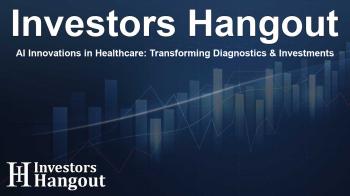AI Innovations in Healthcare: Transforming Diagnostics & Investments

The Rising Influence of AI in Healthcare
As artificial intelligence (AI) technology continues to evolve, its impact on healthcare is becoming increasingly evident. AI algorithms are now enabling faster diagnostics, improving patient care, and creating new opportunities for investments. In clinical settings, advanced AI models are demonstrating capabilities that often surpass traditional medical practices, presenting both challenges and opportunities within the healthcare landscape.
AI Market Growth Projections
The global market for AI in healthcare is projected to surpass $110 billion by 2030, exhibiting a remarkable compound annual growth rate (CAGR) of 38.6%. Such growth signals a fundamental shift in how healthcare is approached, with AI at the forefront of innovation. Industry leaders such as Avant Technologies, Inc. (NASDAQ: AVAI) are paving the way with their AI-driven solutions aimed at improving diagnostic standards and patient outcomes.
Key Players Driving Change
Several public companies are making significant strides in integrating AI technology into their healthcare operations. For instance, Avant Technologies, Inc., in collaboration with Ainnova Tech, is advancing its Vision AI platform designed to detect diabetic retinopathy and other retinal diseases. This platform is part of Avant's commitment to enhancing healthcare solutions through innovative screening and early detection methods.
Investments in AI-Driven Healthcare
From a financial perspective, investing in AI technologies within healthcare presents unique opportunities. Companies like Microsoft Corporation (NASDAQ: MSFT) are betting on AI to streamline healthcare services. Microsoft is actively collaborating with healthcare firms to develop customizable, AI-driven solutions that integrate seamlessly with Azure cloud services.
Transforming Diagnostics with AI
In addition to Avant, other notable companies are leveraging AI to enhance diagnostic accuracy. Recursion Pharmaceuticals, Inc. (NASDAQ: RXRX) is partnering with MIT to launch Boltz-2, an AI model that predicts how molecules will interact with proteins, significantly speeding up drug discovery. This highlights the potential of AI not only in diagnostics but also in pharmaceutical advancements.
The Impact of AI on Preventive Care
AI is reshaping preventive care with platforms designed to tackle conditions like diabetes and Alzheimer’s disease. The Vision AI system by Avant and Ainnova Tech is not just focused on ocular health; it also serves as a gateway to detecting other systemic diseases early on, which could greatly reduce overall healthcare costs and improve patient prognosis.
Innovations and Collaborations in AI Healthcare
Recent partnerships are fostering expansive growth in AI applications across healthcare entities. For example, Astrana Health, Inc. (NASDAQ: ASTH) recently expanded its operations by acquiring Prospect Health, thus enhancing its provider network and capabilities. This strategic move positions Astrana to offer comprehensive care solutions while employing AI to track patient outcomes and streamline services.
Closing the Gap between Technology and Healthcare
With more than 30% of diabetes patients at risk of developing diabetic retinopathy, AI systems like Avant's Vision AI are essential not only for diagnosis but also for timely intervention. These technologies are designed to operate efficiently, even in resource-limited settings, ensuring that a larger population has access to necessary screenings.
The Future of AI in the Medical Field
The collaboration between large tech firms and healthcare providers indicates a bright future for AI-driven medical solutions. Spectral AI, Inc. (NASDAQ: MDAI), with its FDA-cleared DeepView System, exemplifies how AI is becoming an integral part of patient assessments, particularly in predicting wound healing. Such innovations mark the beginning of a new era in medicine, where technology and human expertise work hand in hand.
Frequently Asked Questions
How is AI currently being used in healthcare?
AI is being used for diagnostics, streamlining patient care, predicting disease outcomes, and improving operational efficiencies across healthcare systems.
What are the major companies investing in AI healthcare?
Key players include Avant Technologies, Microsoft, Astrana Health, Recursion Pharmaceuticals, and Spectral AI, all of which are actively developing AI solutions for healthcare challenges.
What impact does AI have on nursing and diagnostic capabilities?
AI aids nurses and doctors by providing enhanced diagnostic tools that lead to quicker, more accurate diagnoses, allowing for timely treatment interventions.
Is investing in healthcare AI solutions lucrative?
With the projected growth of the AI healthcare market, investing in companies pursuing AI technology may yield significant returns as their solutions become essential to future healthcare delivery.
Can AI reduce healthcare costs?
Yes, AI has the potential to reduce costs by improving efficiency, enhancing early detection of diseases, and ultimately decreasing the burden on healthcare systems.
About The Author
Contact Hannah Lewis privately here. Or send an email with ATTN: Hannah Lewis as the subject to contact@investorshangout.com.
About Investors Hangout
Investors Hangout is a leading online stock forum for financial discussion and learning, offering a wide range of free tools and resources. It draws in traders of all levels, who exchange market knowledge, investigate trading tactics, and keep an eye on industry developments in real time. Featuring financial articles, stock message boards, quotes, charts, company profiles, and live news updates. Through cooperative learning and a wealth of informational resources, it helps users from novices creating their first portfolios to experts honing their techniques. Join Investors Hangout today: https://investorshangout.com/
The content of this article is based on factual, publicly available information and does not represent legal, financial, or investment advice. Investors Hangout does not offer financial advice, and the author is not a licensed financial advisor. Consult a qualified advisor before making any financial or investment decisions based on this article. This article should not be considered advice to purchase, sell, or hold any securities or other investments. If any of the material provided here is inaccurate, please contact us for corrections.

